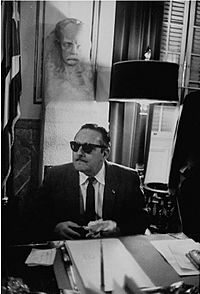Manuel Urrutia Lleó facts for kids
Quick facts for kids
Manuel Urrutia Lleó
|
|
|---|---|

Manuel Urrutia in 1959
|
|
| 13th President of Cuba | |
| In office January 3, 1959 – July 18, 1959 |
|
| Prime Minister | Jose Miro Cardona Fidel Castro |
| Preceded by | Carlos Modesto Piedra |
| Succeeded by | Osvaldo Dorticós Torrado |
| Personal details | |
| Born | December 8, 1901 Yaguajay, Las Villas, Cuba |
| Died | July 5, 1981 (aged 79) Queens, New York, United States |
| Political party | Independent (Liberal) |
Manuel Urrutia Lleó (born December 8, 1901 – died July 5, 1981) was a lawyer and politician from Cuba. He believed in freedom and fairness. He worked against the governments of Gerardo Machado and Fulgencio Batista in the 1950s. Later, he became the president in Cuba's first government after the Cuban Revolution in 1959. Urrutia resigned after only seven months because of disagreements with Fidel Castro, a key leader of the revolution. He then moved to the United States.
Before Becoming President
Manuel Urrutia was born in Yaguajay, a town in Las Villas, Cuba. He was an important person in the group that peacefully resisted Fulgencio Batista's government during the Cuban Revolution. By April 1958, Fidel Castro's 26th of July Movement had already chosen Urrutia to be the future president.
In 1957, Urrutia was the judge in a court case. Members of the 26th of July Movement were accused of "anti-government activities." Urrutia decided that the people accused were doing what they had a right to do.
A year later, he visited the United States. He wanted to get support for the revolution. He successfully asked the US to stop sending weapons to Batista's army. People thought that choosing Urrutia, who was educated and believed in freedom, would be good for Cuba's relationship with the US.
His Time as President
The Cuban Revolution won on January 1, 1959. Urrutia returned from Venezuela, where he had been living, to become president. He moved into the presidential palace. His new government included many experienced Cuban politicians. It also had people who supported businesses, like José Miró Cardona, who became prime minister.
Some new rules caused problems. For example, the government wanted to cut down on the number of workers in some areas. This made many workers unhappy. Fidel Castro, who was the leader of Cuba's new army, stepped in. He asked for the changes to be put on hold until new jobs could be found.
There were also disagreements about pay cuts. Castro demanded that all government workers' salaries be lowered. This included the president's salary, which Urrutia had inherited from Batista. It was $100,000 a year. In February, Miró suddenly resigned. Castro then became prime minister. This made Castro much more powerful. Urrutia became a president in name only, with less real power.
As Urrutia's role in making laws became smaller, other problems between him and Castro continued. Urrutia believed that elections should be brought back. But Castro disagreed. He felt that elections would bring back the old, dishonest system. This system had corrupt political parties and unfair voting, like during Batista's time.
Then, a newspaper called Avance said Urrutia bought a fancy house. The newspaper said this was a wasteful act that went against the revolution's goals. Many people got upset. Urrutia denied the story and took the newspaper to court. This story made the tensions between different groups in the government even worse. However, Urrutia publicly said he had "absolutely no disagreements" with Fidel Castro.
Urrutia tried to keep the Cuban government, including Castro, away from the growing influence of the Communists. He spoke out against the Communists in public. Castro had not openly said he was a Communist. But Urrutia had been against Communists for a long time. He said they had refused to support the fight against Batista. In an interview, he stated, "If the Cuban people had listened to them, we would still have Batista with us... and all those other war criminals who are now running away."
Resignation
On July 17, 1959, Conrado Bécquer, a leader for sugar workers, demanded Urrutia's resignation. Castro himself resigned as Prime Minister of Cuba to show his protest. But later that day, Castro appeared on television. He spoke for a long time against Urrutia. Castro claimed that Urrutia "complicated" the government. He also said Urrutia's strong anti-Communism was causing problems.
Many people supported Castro's words. Large groups gathered around the presidential palace, demanding Urrutia resign. Urrutia then resigned. On July 23, Castro became prime minister again. He appointed Osvaldo Dorticós Torrado as the new president.
After Leaving Cuba
After leaving his job, Urrutia found a safe place in the embassy of Venezuela. Later, he settled in Queens, New York, in the United States. He worked as a university professor until he passed away in 1981.
See also
 In Spanish: Manuel Urrutia Lleó para niños
In Spanish: Manuel Urrutia Lleó para niños
 | Delilah Pierce |
 | Gordon Parks |
 | Augusta Savage |
 | Charles Ethan Porter |

